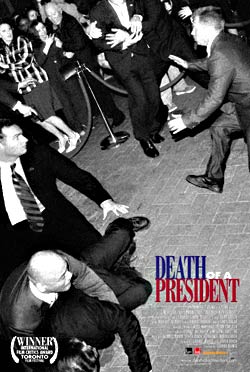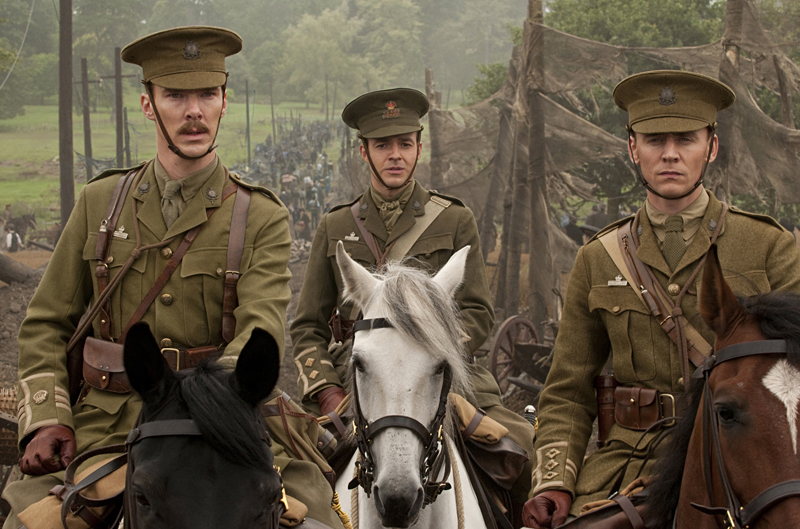Manufactured history guarantees a manufactured controversy: Gabriel Range’s Death of a President, which docudramatizes the 2007 assassination of George W. Bush, has been preceded by a long, raucous fanfare. Excoriated on talk radio, damned as a snuff film, banned by two theater chains, the British production has also garnered celebrity disendorsements. It was criticized unseen by assassination movie veteran Kevin Costner (“We can’t, like, wish . . . “) and denounced (also unseen) by Hillary Clinton: “That anyone would even attempt to profit on such a horrible scenario makes me sick.”
Is Death of a President more exploitative than JFK? (That was a snuff film.) And didn’t Fox turn a buck on Independence Day, which jovially incinerated the White House when Mrs. Clinton was actually living there? The difference is lèse-majesté: Death of a President presents the “real” Bush in a fictional situation. (It’s the opposite of the egregious telefilm DC 9/11: Time of Crisis, which featured a fictional Bush.)
Dramatically inert but a minor techno-miracle, Range’s movie is a faux documentary with fake talking heads and seamless digital effects. Invented characters are gumped into actual news events and vice versa. The editing and audio sleight of hand are nearly as impressive. Range, who previously “documented” the collapse of British transport, used actual Chicago street protests to provide the illusion of crowds breaking police barriers to mob the presidential limo. That’s not the money shot: The assassination occurs when, leaving the Sheraton, supposedly surrounded by 12,000 flag-burning demonstrators, the president elects to work the rope line.
Death of a President‘s method and location recall Haskell Wexler’s Medium Cool, which staged a fictional story against the chaotic backdrop of the 1968 Democratic Convention. But Range skews more theoretical than sensationalist—and if he’s celebratory, it’s not in the way Rush Limbaugh imagines. Bush is presented as a martyr. (Appropriately, the movie is distributed by the company that released The Passion of the Christ.) Range may be overcompensating but he has the slain president praised throughout by adoring staffers and mealy-mouthed acolytes; even at the hospital, a functionary tells the press that the chief surgeon has “never seen such a strong heart in a man of the president’s age.” The obvious reference is Ronald Reagan. If the attempt on Reagan’s life offers Range a dramatic template, the mass amnesia occasioned by Reagan’s funeral is far more crucial—and not just because it provides Dick Cheney’s eulogy.
Bush is but a special effect. Death of a President is really a movie about 9/11—an essay on a national tragedy used to create an even greater tragedy. (That’s the scenario that really should have made Sen. Clinton “sick.”) It’s also a movie about itself—a demonstration of reality shaped to fit a particular hypothesis. There doesn’t seem to be any irony there. Range saves that for the investigation. The system is flooded with detainees while, in the matter of suspects, use value trumps truth. President Cheney suggests that his security adviser “take another look” at Syria. The infinite elasticity of “national security” enables a new Patriot Act to trample the Bill of Rights. But Death of a President‘s warning about blowback has its own unintended consequences: What follows the assassination is so awful that anyone might be excused for leaving the theater convinced of the urgent need to keep Bush alive.
The world was awash in cinema vérité 40 years ago, when British maverick Peter Watkins more or less invented the faux documentary with The War Game. He’s been refining the form ever since, but Death of a President has nowhere near Watkins’ agitational fervor. (Or his critical intelligence: Even if you believe that Bush is the worst president in history, it matters not whether he is impeached, falls from his bicycle, or gets raptured to heaven—the damage has been done.) Death of a President is ultimately just an exercise. There’s a far more subversive political mockumentary coming next week. I invite President Bush, Sen. Clinton, and all politicians to get down with Borat.








